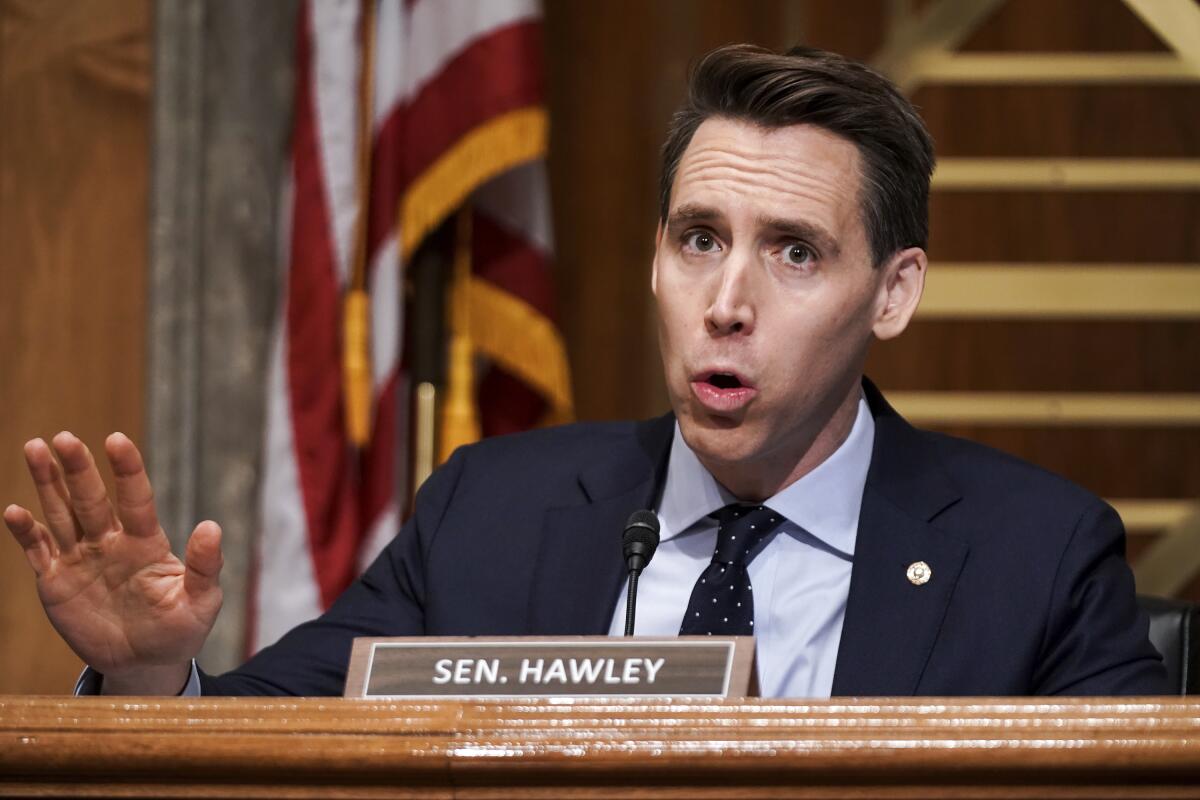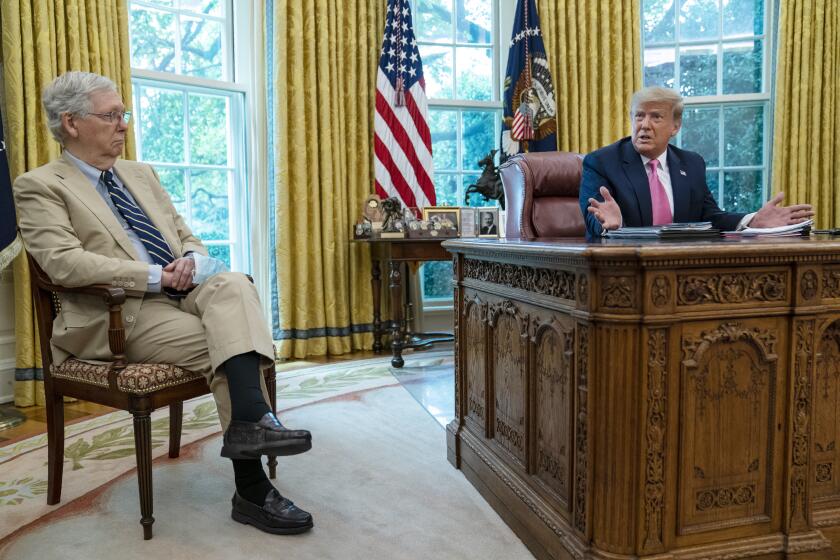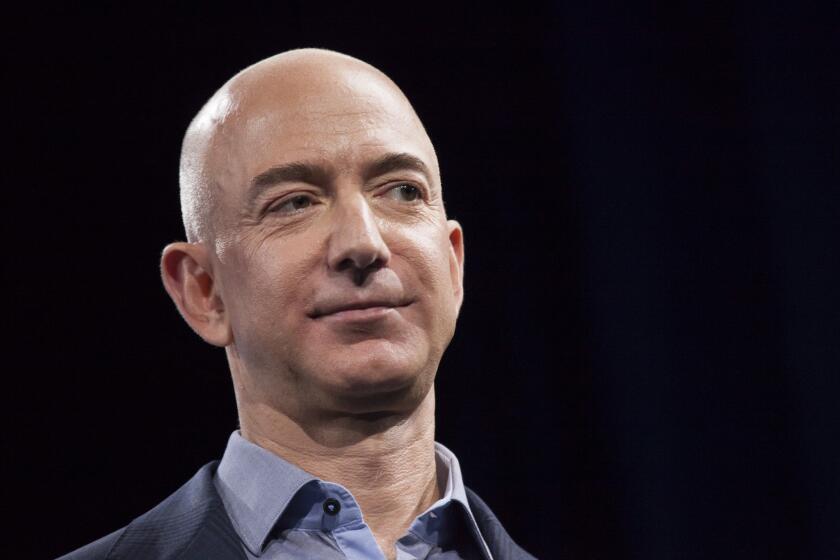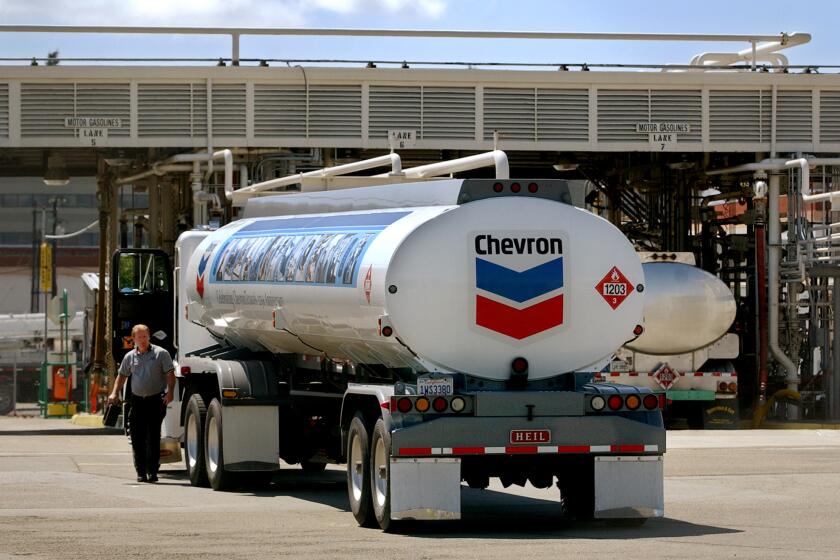Column: Corporations ‘suspend’ political donations — but Citizens United is the real problem

- Share via
Reading the ever-lengthening list of big corporations reconsidering their political contributions in the wake of last week’s Republican-inspired insurrection on Capitol Hill, one might be tempted to think that a sea change in big-money influence on our elections is upon us.
The roster certainly is eye-catching. More than two dozen public companies have announced that they’ll suspend all political donations for anywhere from a few months to the foreseeable future, or will cease funding for the 147 Republican senators and House members who objected to the certified results of the electoral college.
Among them are American Express, Microsoft, Google, Facebook, Amazon, Coca-Cola, Citibank and AT&T. (Judd Legum’s Popular Information newsletter is maintaining an up-to-date list.)
With the advent of the Internet, prompt disclosure of expenditures can provide shareholders and citizens with the information needed to hold corporations and elected officials accountable for their positions and supporters.
— Supreme Court Justice Anthony M. Kennedy, in fantasyland (2010)
You should hold your applause, for several reasons.
One is that many of these donors enthusiastically bankrolled some of the politicians now in their hall of shame for years while it was obvious that they were working against the public interest by supporting gerrymandering and other forms of voter suppression.
The companies are professing to see things in a new light after the consequences of their support became graphic with Wednesday’s riot on Capitol Hill. But they can’t cleanse themselves of the stink now any more than the Trump administration figures abandoning his sinking ship.
Second, some of their reappraisals are suspiciously vague.
Some referenced last week’s insurrection — Bank of America, for instance, said it would “review its decision making criteria in light of the actions that contributed to the appalling violent assault on the U.S. Capitol.”
Jumping off the sinking S.S. Trump isn’t an action worthy of praise.
But many others left the connection unspecified. And there appears to be no record thus far of a company disavowing any political contributions in the future.
Moreover, suspending contributions at this stage of the political calendar is the equivalent of a free pass. The first months of a new political cycle — especially at the dawn of a new presidential administration — are a relative dead period for election fundraising. No one will really notice the drying up of corporate spending unless it persists past midyear 2021.
The main reason, however, is that voluntary actions by Big Business do nothing to outweigh the central flaw in our system of funding political campaigns: the Supreme Court’s 2010 Citizens United decision, which opened the floodgates to corporate spending.
Citizens United will be 11 years old Jan. 21, the day after Joe Biden’s presidential inauguration. The damage it has done in that time to American democracy is incalculable, and the chances of reversing it through a change in the court or a constitutional amendment are low.
The 5-4 decision, written by Justice Anthony M. Kennedy, overturned federal restrictions on political spending that in some cases dated back more than a century. The court upheld specific limitations on direct donations to candidates, but invalidated limits on “independent expenditures” — that is, spending by entities not directly coordinating with candidates or parties.
The most notable result was the rise of so-called super political action committees, or super PACs. Contributions to conventional PACs, which tend to be associated with specific companies or unions, are capped at $5,000 per donor.
Only employees, executives, shareholders and their families can contribute to a company-connected PAC; the corporation itself can’t make a donation, though it can cover the PAC’s legal and administrative fees — and of course corporate managements effectively can control the PAC’s political contributions.
The GOP has buried the notion of the ‘loyal opposition’ in the U.S., along with the peaceful transfer of power
Super PACs, however, are “mutant PACs that can raise, and then spend, unlimited amounts [of] money from corporations, unions and individuals on political advertisements, as long as they do not coordinate their spending with any candidate,” as the Brennan Center for Justice described them in 2012.
The court also left open a loophole allowing super PACs to keep their donors secret. That made a mockery of Kennedy’s almost childlike confidence that disclosure of donors’ identities would effectively inoculate the political system from corruption.
“With the advent of the Internet, prompt disclosure of expenditures can provide shareholders and citizens with the information needed to hold corporations and elected officials accountable for their positions and supporters,” Kennedy wrote.
“The First Amendment protects political speech; and disclosure permits citizens and shareholders to react to the speech of corporate entities in a proper way,” Kennedy continued. “This transparency enables the electorate to make informed decisions and give proper weight to different speakers and messages.”
Would that were so. By consistently opposing shareholder resolutions calling for disclosure of political spending, corporate managements have done their best to keep their shareholders in the dark. Of 24 such resolutions proposed last year at public companies, only four received a majority approval; even in those cases, the resolutions are not binding on management.
Column: Last year CEOs pledged to serve stakeholders, not shareholders. You were right not to buy it
In the year since the CEOs promised to serve more than just shareholders, there have been few if any no signs that major corporations have taken real any steps they wouldn’t have taken without outside pressure, whether from public opinion or government regulation.
Those resolutions will be harder to place on corporate annual meeting agendas in the future, thanks to a rule approved by the Securities and Exchange Commission in September in a direct attack on shareholder democracy.
The harvest of Citizens United was a torrent of super PAC financing of American elections. In the 2019-20 political cycle, according to the Center for Responsive Politics, PACs made $529.3 million in political donations. Super PACs, however, donated $3.2 billion.
With Democrats holding the White House and both chambers of Congress, it’s possible that real election finance reform is on the horizon. But it shouldn’t be taken for granted. The so-called DISCLOSE Act, which was introduced by congressional Democrats three times from 2010 to 2014, would have tightened disclosure rules, but was defeated by Republican votes or filibustering.
The act’s provisions were incorporated into H.R. 1, an omnibus election reform law passed by the Democratic-controlled House in a party-line vote in 2019. But the measure wasn’t taken up by the GOP-controlled Senate. As for overturning Citizens United via a progressive majority on the Supreme Court or a constitutional amendment, we wouldn’t bet on the prospects of either event happening in the near future.
That brings us back to the changes in corporation policies on political donations over the last few days. The most gruff response may be that of Hallmark.
The Kansas City, Mo., greeting card maker has demanded a return of donations by two GOP senators who challenged the certified electoral results during the joint congressional session that was interrupted by the insurrection: Sen. Roger Marshall of Kansas, who received $5,000 from the company PAC, and Sen. Josh Hawley of Missouri, who received $3,000. Whether they’ve complied is unknown.
Chevron’s directive from shareholders: Report how you’re lobbying against the environment.
Other companies that have said they will indefinitely suspend donations to the 147 senators and representatives who challenged the certified results include Marriott International, Blue Cross Blue Shield Assn., Dow Chemical, Mastercard and AT&T. The length of the suspension in those cases is open ended. American Express, however, said it would end contributions to the 147 permanently.
Other companies are pausing all contributions for some period of time. They include Citibank, Hilton Brands, Google, Microsoft and Facebook. Some placed a three- or six-month term on their review, others said the freeze would continue indefinitely.
Almost by definition, these are companies that supported any or all of the 147 lawmakers up to now. How carefully did they vet the recipients of their largesse?
Holding these companies to their own promises will require considerable vigilance as time goes on; members of Congress will all start soliciting donations again within a few months, but some senators won’t be seeking reelection until as long as six years from now. Will memories of Wednesday last that long?
It’s also proper to keep in mind that rhetorical promises made by corporate managements often aren’t worth the paper their press releases are printed on. As we reported last year, the 2019 pledge by Big Business to broaden its commitment to the interest of all stakeholders, not just shareholders, has had almost no follow-up.
One factor in holding companies to their pledge on political contributions is how deeply the Capitol insurrection burns into the public mind. Some traumatic public events, such as the Kennedy assassination or 9/11, leave scars that can last decades. Others fade.
As long as the Citizens United decision remains the law of the land and corporate managements and our federal lawmakers resist efforts to force disclosure of political spending, there’s a good chance that big-money donors will return to business as usual as fast as they can. Nothing is holding them back, except public pressure.
More to Read
Inside the business of entertainment
The Wide Shot brings you news, analysis and insights on everything from streaming wars to production — and what it all means for the future.
You may occasionally receive promotional content from the Los Angeles Times.














